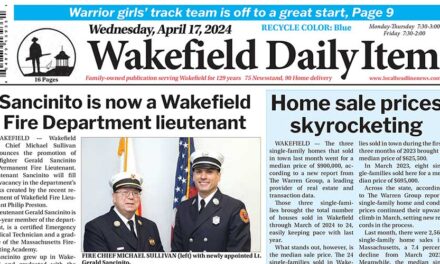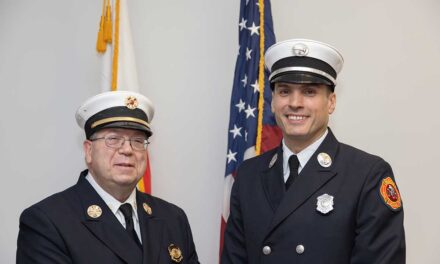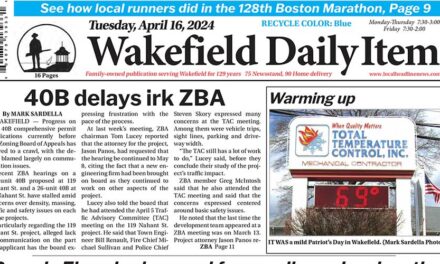Published in the January 27, 2017 edition.
By MARK SARDELLA
WAKEFIELD — Will making up snow days by adding days to the school calendar at the end of June become a thing of the past?
Thanks to technology, that appears to be the direction in which Wakefield is heading, and don’t be surprised to see other school districts around the area following suit.
“In 2017, with the level of technology that we have, why are we still making up snow days the way we did in the 1980s?” Superintendent Dr. Kim Smith wondered aloud at this week’s School Committee meeting.
She unveiled the snow day idea as part of a broader “Learn Anywhere” initiative that she has been working on with a team of Wakefield educators.
Smith said that the question has been on her mind for a long time. Schools continue to operate on the presumption that everyone has to be in the same place at the same time in order for education to take place. But schools need to start thinking in different and more innovative ways to engage students as 21st century learners, Smith maintained. She said that she has been thinking about the possibility of “distance learning” as a way that students can access assignments on snow days via Google Classroom or through a basic web site.
“Everybody knows that when we add school days in June, it’s not the optimal time for learning,” Smith said. The weather is warm and kids are distracted with anticipation of summer vacation, she observed.
By using technology, Smith argued, education can continue on snow days. Teachers and students can continue with normal classwork through Google Classroom or a teacher could plan ahead for the winter and post four or five articles on a web site that students would be expected to tackle on snow days.
What happens in the case of a power outage or in situations where some kids might not have full access to technology? Smith said that she had anticipated those concerns and said that no snow day assignments would be due on the next day back to school in order to make sure that all students have an opportunity to complete the work regardless of their individual circumstances.
Students will be expected to produce a document, a presentation or video as evidence of assignment completion.
Smith said that she had run her idea by the Massachusetts Department of Education, which said that they would accept it gave her the “thumbs up” to implement the idea as long as the local School Committee approved it.
Smith said that Wakefield would be the first school in the state to use this method of continuing education on snow days, although Burlington did try a different kind of pilot program a few years ago.
School Committee member Anne Danehy called the idea “super exciting” and “well thought-out.” Committee member Thomas Markham said that the most compelling part to him was that it avoids the lack of productivity at the end of June.
Smith said that she wants to solicit more feedback from the educational community before asking the School Committee to vote on the proposal at a future meeting.
Another part of the “Lean Anywhere” initiative involves partnering with other school districts to form of ‘blended classrooms.”
Through the Learn Anywhere initiative, students would be presented with an online learning option similar to those offered at the collegiate level or on the job training.
“We will begin this project by partnering with one high school from another community in Massachusetts to offer two online elective courses.” Smith said. “Each class will be comprised of an equal number of Wakefield and partner school students, with one course section taught by a Wakefield teacher and the other taught by a teacher from the partner school. These classes will offer a “blended” approach to online learning, meaning that there will be one or more face-to-face class sessions in addition to the cohort’s regular interaction online. Teachers will use Google Classroom as a digital platform to deliver instruction, curricular resources, and assess student learning.
“Wakefield students will have the opportunity to learn with students from a different community, expanding the diversity of their classmates, perhaps for the first time in their school experience,” Smith said. “When students respond to one another’s work or participate in group projects, they will collaborate with students with different life experiences and perspectives. Unlike the regimen of the daily class schedule, students can meet and complete work online, anywhere, anytime.”
Smith noted that Wakefield Memorial High School has ten years of experience as a member of the Virtual High School consortium with great success. WMHS students have completed courses taught by instructors from all around the world, comprised of students from various countries and cultural origins.
“These formative experiences are an exciting way for students to learn more about their world and to discover how learning can happen in multiple formats,” Smith added.
Another piece of the Learn Anywhere initiative involves expanded summer learning opportunities.
The Wakefield Public Schools, in collaboration with the Beebe Library, will launch a new initiative centered on academic enrichment for the summer of 2017. Each Wakefield Public School student will be expected to complete a product based on the following: One of four books recommended by the Beebe Library and WPS Library/Media Specialists, and the exploration of a passion or interest.
Smith said that the “passion/interest” component was included because traditional summer learning experiences – most often prescriptive reading programs – do not always have the effect of inspiring the love of reading or learning. Adding personalization and choice to the summer learning experience, both in the exploration of a topic and in the presentation of the end product, deepens the personal investment for students.
“In Learn Anywhere, we promote the idea that learning happens just about anywhere, opening the world of discovery and creativity.” Smith said. “A summer enrichment program that encourages students to explore their individual passions or interests provides a self-directed authentic learning experience. By offering a variety of options for the culminating product, students can tailor their findings in specific ways that reflect who they are as a learner and person.”




